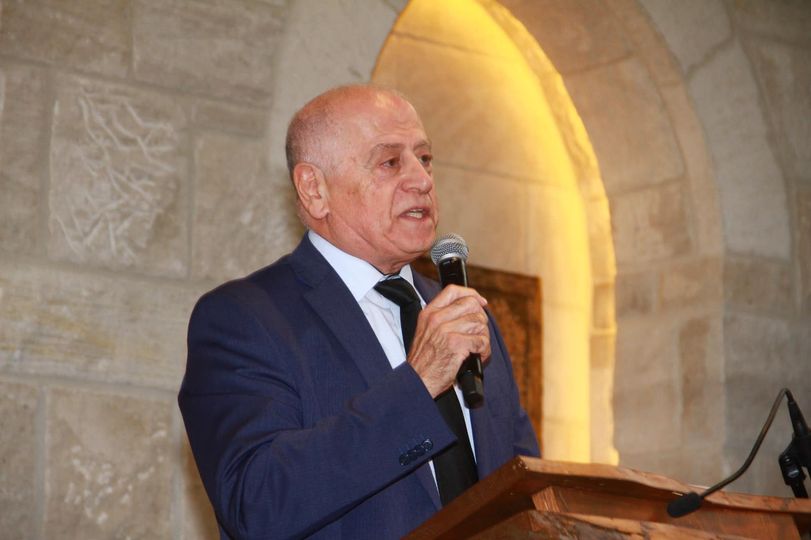Israeli Withdrawal from Lebanon Tomorrow
Colonel Charbel Barakat/February 17/2025
(Free translation from Arabic by Elias Bejjani)
الانسحاب الاسرائيلي من لبنان غدا
الكولونيل شربل بركات/17 شباط/2025
كانت المرحلة الأولى من الانسحاب الاسرائيلي حددت بمهلة ستين يوما بعد الاتفاق على وقف اطلاق النار وتنتهي في السادس والعشرين من شهر كانون الثاني الماضي، ولم تنفذ بشكل كامل، فقد طلبت اسرائيل مهلة أخرى تنتهي في الثامن عشر من شباط الحالي لاتمام انسحابها. وكان الانسحاب الأول شمل بعض النقاط التي دخلها هؤلاء خلال الحرب لوقف اعتداءات حزب الله وعناصره، وكانت جهزت لاعمال قتالية ومنها داخل القرى والتجمعات السكنية، ما أجبر الجيش الاسرائيلي على الطلب من الأهالي المدنيين اخلاء مساكنهم قبل دخوله اليها والقيام بأعمال التفتيش والقتال حيث وجب وتدمير المنشآت العسكرية فيها.
كان قرار مجلس الأمن الدولي 1701 الذي صدر بعد حرب 2006 ينص عل سحب عناصر الحزب من جنوب الليطاني، ومن هنا كانت حكومة اسرائيل قد أعلنت بأن هدفها الوصول إلى نهر الليطاني وتنظيف المنطقة الواقعة بينه وبين الحدود من تواجد عناصر حزب الله ومقاتليه والتمركز فيها لمنع استهداف المنطقة الشمالية، وبالتالي امكانية إعادة المهجرين الاسرائيليين إلى قراهم. لكن الحكومة اللبنانية تعهدت بالقيام بالمهمة، وليس فقط منع تواجد حزب الله جنوب الليطاني، بل أيضا حصر السلاح بسلطة الدولة، حيث تحددت العناصر التي يحق لها حمل السلاح بشكل دقيق على كامل الأراضي اللبنانية بدءً من عناصر الجيش وقوى الأمن وصولا إلى حراس البلدية. ما يعني أنه على الدولة اللبنانية التزام تجريد كل الأحزاب من اسلحتها تنفيذا للقرار الدولي 1559 الذي يعتبر أساسا للقرار 1701. وقد مكّن تحجيم حزب الله بعد هذه الحرب من انتخاب رئيس للجمهورية وتعيين رئيس للوزراء ما لم يكن بالامكان خلال سنتين من الدوران في حلقة مفرغة.
لكن الحكومة اللبنانية لم تبسط سيطرتها على البلاد كما هو وارد بالاتفاق واكتفت بالطلب إلى الجيش اللبناني تسلّم المواقع التي يخليها الأسرائيليون جنوب الليطاني. من هنا فقد كان من يرعى الاتفاق مكبّل اليدين تجاه عدم وفاء الحكومة اللبنانية بتعهداتها، ما اضطره للمساومة مع الاسرائيليين حول تنفيذ الأتفاق. وهكذا فقد أخلت اسرائيل كامل المناطق البعيدة عن الحدود قبل موعد الستين يوم وطلبت تمديد المهلة إلى الثامن عشر من شباط لكي تنهي تنظيف المناطق الحدودية بشكل كامل من التحصينات والأبنية التي يمكن أن تستخدم كقواعد للقتال في المستقبل.
لم تتم العملية بهذه البساطة إذ نفذ حزب الله خطة اعلامية أدت إلى تحرك شعبي شدد على عودة المواطنين إلى قرى لم ينسحب منها الاسرائيليون ولا دخلها الجيش اللبناني، ما أدى إلى مقتل وجرح عدد من المواطنين بدون سبب إلا نجاح الحزب بخلق مشكل للحكومة الجديدة وحشرها بين تنفيذ “اوامر العدو” أو مساعدة الأهالي للعودة إلى بيوتهم. وكأن مسألة العودة بهذه البساطة، فقد كان الحزب فرض على لبنان الحرب خلال سنة كاملة من التحرش الغير مجدي دمرت المساكن والبنى وقتلت من قتلت تحت الركام، ومن ثم ظهر جليا استخدامه للمواطنين كدروع بشرية ولمنازلهم كمتاريس قتالية، ولم يستطع المواجهة ولا الصمود الذي طالما تغنى بهما. والحكومة التي تنوي اعادة المواطنين إلى قراهم اليوم مضطرة إلى استجداء القروض والمساعدات لبناء ما تهدم أو أقله تأمين أمكنة لاستقبال الأهالي في هذه القرى ريثما تنتهي عملية إعادة البناء.
اليوم يدور الحديث عن انسحاب الاسرائيليين من كافة القرى ولكنهم يطالبون بالبقاء في خمس تلال تشرف على القرى الاسرائيلية القريبة من الحدود لتطمين السكان الذين سيعودون إليها بعدم تعرضهم لاعتداءات كالتي حصلت في منطقة غزة مستقبلا، وهو أمر مفهوم نفسيا ولا يؤثر على حق لبنان باسترجاع أراضيه ولا حتى على سيادته، ويمكن اجراء اتفاق حول المدة المطلوبة للشعور بالأمان والعودة إلى ما قبل 2023 أو اثبات الدولة اللبنانية بأنها مسؤولية عن حماية حدودها كما تعهدت في اتفاقية الهدنة التي رعت هذه الحدود مدة تزيد عن عشرين سنة بدون أي حوادث تذكر وذلك قبل اتفاقية القاهرة المشؤومة، أو ريثما يتوصل لبنان مستقبلا إلى تفاهمات حول السلام الدائم الذي يجري الحديث عنه في المنطقة كلها.
ولكن حزب الله وأسياده في طهران لن يقبلوا بأي حل إذا ما طلب رأيهم، وهم يفضلون الفوضى التي تعيد لهم دورهم في تخريب بيوت اللبنانيين وأسس دولتهم، وجعلهم متاع يشرى ويباع في سوق حروب الشرق الأوسط التي ستنتهي في كل مكان ما عدى لبنان. لأن من يتهافت على تسلّم المسؤولية لا يزال يعيش بعقلية النظام السوري، أي أنه يريد أن يستفيد من السلطة بينما يترك القرار لغيره، ولا يمكنه تحمّل المسؤولية فيتغطى خلف شعارات ونظريات واهية بينما يترك القرار للشارع وللغوغائيين. ومن هنا نحذّر من مستقبل قاتم حيث سيصبح لبنان فيه دولة مارقة يحكمها ربما مسؤول تعينه الأمم المتحدة كما هو الحال في كوسوفو إذا لم يكن منطقة سائبة لا يحكمها قانون كما هو الحال في الصومال. فإذا كان من يتصدّر القرار بدءً من رئيس الجمهورية ورئيس مجلس الوزراء اللذين توسم بهما اللبنانيون خيرا لا يعرفون التمييز بين مصلحة الوطن ودور الرؤساء في رعايتها، وبين تحرك الرعاع وتركهم يسيطرون على أمن البلاد والعباد، فإن مستقبل لبنان لا يبشر بالخير، وكل الآمال التي بنيت على القادة الجدد ستنهار، وأول الغيث طلب الرئيس الأميركي وقف المساعدات للبنان ريثما يُظهر قادته حسن الادارة والتحلي بروح الحكمة والقيادة لا بالجبن والتقاعس. فهل من يسمع أو هل من يفهم فيعي إلى أين تسير القافلة؟..
Israeli Withdrawal from Lebanon Tomorrow
Colonel Charbel Barakat/February 17/2025
(Free translation from Arabic by Elias Bejjani)
The first phase of the Israeli withdrawal was set for sixty days after the ceasefire agreement and was scheduled to end on January 26th. However, it was not fully implemented, as Israel requested an extension until February 18th to complete its withdrawal. This initial withdrawal included vacating positions occupied during the war to stop Hezbollah’s attacks. These positions, often within villages and residential areas, required the Israeli army to evacuate civilians before entering, conduct searches, engage in hostilities, and destroy military installations as necessary.
UN Security Council Resolution 1701, issued after the 2006 war, stipulated the withdrawal of Hezbollah elements from south of the Litani River. Israel’s objective was to reach the Litani and clear the area of Hezbollah fighters to prevent attacks on its northern regions, enabling displaced Israelis to return to their villages. The Lebanese government pledged to take responsibility for preventing Hezbollah’s presence south of the Litani and to restrict weapons to state authorities. This commitment extended to enforcing UN Resolution 1559, which called for the disarmament of all militias, forming the foundation for Resolution 1701.
Despite these commitments, the Lebanese government failed to extend its control over the south, merely assigning the Lebanese army to take over positions vacated by the Israelis. This failure forced international sponsors of the agreement into a difficult position, leading to compromises with Israel over its implementation. Israel evacuated areas far from the border within the sixty-day deadline but requested an extension to February 18th to clear the border areas of fortifications and structures that could be used for future attacks.
The withdrawal process was anything but simple. Hezbollah launched a media campaign that spurred a popular movement demanding the return of civilians to villages from which the Israelis had not yet withdrawn or where the Lebanese army had not yet deployed. This reckless push led to unnecessary deaths and injuries, creating a dilemma for the new Lebanese government: either comply with “enemy orders” or assist citizens in returning to their homes. As though the return was simple, Hezbollah had imposed a year-long war of harassment, destroying homes, infrastructure, and lives, using civilians as human shields, and turning their homes into combat zones. The Lebanese government, now tasked with facilitating this return, is forced to beg for loans and assistance to rebuild what was destroyed and to provide temporary shelter until reconstruction is complete.
Today, discussions revolve around the Israelis’ full withdrawal from all villages. However, Israel insists on maintaining a presence on five strategic hills overlooking its border villages to reassure its residents will not face future attacks like those experienced in Gaza. This demand, while psychologically understandable, does not compromise Lebanon’s right to reclaim its lands or its sovereignty. A practical agreement could be reached on a transitional security period, allowing the Lebanese state to prove its ability to protect its borders, as it did for over twenty years without significant incidents before the ill-fated Cairo Agreement. Alternatively, Lebanon could negotiate regional understandings on permanent peace.
Yet, Hezbollah and its masters in Tehran will not accept any solution if their input is sought. They thrive on chaos, using it to sustain their destructive influence over Lebanon, turning the nation into a bargaining chip in the Middle East’s endless conflicts. While wars may end elsewhere, Lebanon remains trapped because its leaders, still influenced by the Syrian regime’s mentality, seek power without responsibility. They hide behind hollow slogans and leave critical decisions to the street and the demagogues.
Thus, we warn of a bleak future where Lebanon risks becoming a rogue state, potentially ruled by a UN-appointed official, as in Kosovo, or descending into lawlessness, as in Somalia. If Lebanon’s new leaders—starting with the President and Prime Minister—fail to distinguish between true national interest and mere political survival, the country’s future is grim. The hopes pinned on new leadership will collapse, and the nation may soon face an irreversible crisis. Does anyone hear or understand where this dangerous path is leading?
Colonel Charbel Barakat
***Colonel Charbel Barakat, a retired Lebanese Army officer, historian, terrorism expert, and author of numerous works on Lebanon, the Iranian regime’s schemes, and jihadist movements, has testified multiple times before the U.S. Congress on critical issues, including Iranian and Syrian terrorism, the Syrian occupation of Lebanon, jihadist threats, and the pursuit of Middle East peace.






















